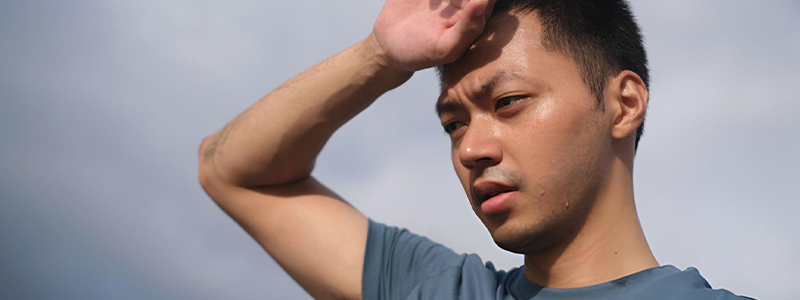Archives

Dehydration headaches are a common but often underestimated issue that can be incredibly bothersome. In our fast-paced lives, we tend to overlook the importance of staying adequately hydrated. Dehydration headaches serve as a reminder that our bodies need a consistent supply of fluids to function optimally. In this comprehensive guide, we will delve deep into the world of dehydration headaches, covering their symptoms, causes, and, most importantly, how to find relief. By the time you’ve finished reading, you’ll be equipped with the knowledge to prevent and effectively manage these often-pesky headaches.
What Exactly is a Dehydration Headache?
A dehydration headache is a type of headache that occurs when your body loses more fluids than it takes in. This leads to a reduction in blood volume, which results in less oxygen and essential nutrients reaching your brain, ultimately causing head pain. Proper hydration is not just about quenching your thirst; it’s essential for overall health, ensuring your body can perform its vital functions effectively.
Recognizing the Symptoms of Dehydration Headaches
Dehydration headaches are often characterized by pulsating head pain, which can be intense and throbbing. They can also present as a persistent, dull ache that lingers in the background. People with dehydration headaches frequently experience heightened sensitivity to light and sound. Concentrating on tasks becomes difficult, and some may even experience nausea and vomiting as accompanying symptoms.
Unearthing the Causes of Dehydration Headaches
These headaches can be caused by a range of factors, with insufficient water intake being a primary contributor. Excessive sweating, whether due to physical activity or hot weather, can quickly deplete your body of fluids. Consuming diuretic substances like caffeine and alcohol can also increase the risk of dehydration. Hot and arid environments, where you might not realize how much you’re sweating, can be a trigger. Certain medications can affect your hydration status, making it crucial to be aware of their side effects.Distinguishing Dehydration from Migraine: Know the Difference
It’s important to differentiate between dehydration headaches and migraines, as they can share some symptoms. While both types of headaches can cause head pain, migraines are a neurological condition with distinct triggers and symptoms. Understanding these distinctions can help you determine the most appropriate treatment for your headache.The Characteristics and Locations of Dehydration Headaches
Dehydration headaches often manifest as a tight, band-like sensation around the head. They typically occur at the front or back of the head, and sometimes involve the forehead and temples. Recognizing the typical location and characteristics of these headaches can aid in their diagnosis.Dehydration Headache Duration: What to Expect
The duration of a dehydration headache can vary from person to person and can depend on several factors. Generally, milder cases might resolve relatively quickly once you rehydrate, while more severe headaches can persist for hours or even days. The length of the headache may be influenced by the severity of dehydration, your individual hydration levels, and external factors such as temperature and physical activity.Link Between Dehydration and Headaches
Dehydration has a profound impact on the brain. It can reduce cognitive function, impair concentration, and even lead to irritability. One of the key mechanisms behind dehydration headaches is the drop in blood pressure, which reduces the amount of blood flowing to the brain. Additionally, dehydration can disrupt the balance of electrolytes in your body, which also plays a significant role in headache development.Effective Relief and Treatment for Dehydration Headaches
Finding relief from dehydration headaches primarily involves rehydration, which is the most effective treatment. Simply increasing your fluid intake can alleviate the headache. Staying consistently hydrated is crucial not only for treating dehydration headaches but also for preventing them from occurring in the first place. Natural remedies such as applying cool compresses to your forehead and neck, practicing relaxation techniques, and even adjusting your environment for optimal comfort can help alleviate symptoms. In more severe cases or when natural remedies don’t provide sufficient relief, over-the-counter pain relievers can be used.
Intravenous (IV) Therapy for Dehydration Headaches
Intravenous (IV) therapy is a rapid and efficient method for alleviating dehydration headaches. It involves administering a saline solution directly into your bloodstream, which quickly restores hydration levels. This approach is particularly useful in severe cases of dehydration or when you need swift relief. However, it’s essential to consider the potential risks and benefits of IV therapy before pursuing this option.
Staying well-hydrated is the key to avoiding dehydration headaches. By understanding their causes, symptoms, and treatment options, you can take proactive steps to prevent these discomforting headaches and enjoy a healthier, headache-free life. Remember that hydration isn’t just essential for overall well-being, but it’s also crucial for maintaining optimal brain function and preventing those pesky headaches.
Facebook
Twitter
LinkedIn
Pinterest
Other Services
Thyroid test at home
Error: Contact form not found.
You might also like
The Diagnostic Value of CT Scans
Lab test at Home Food Intolerance Doctor at Home Physio
August 17, 2024
The Vital Role of Vaccinations: Essential for All Ages
Lab test at Home Food Intolerance Doctor at Home Physio
August 17, 2024
Breastfeeding Awareness Week: Simple Tips for New Moms
Lab test at Home Food Intolerance Doctor at Home Physio
August 3, 2024
July 27, 2024
July 20, 2024

